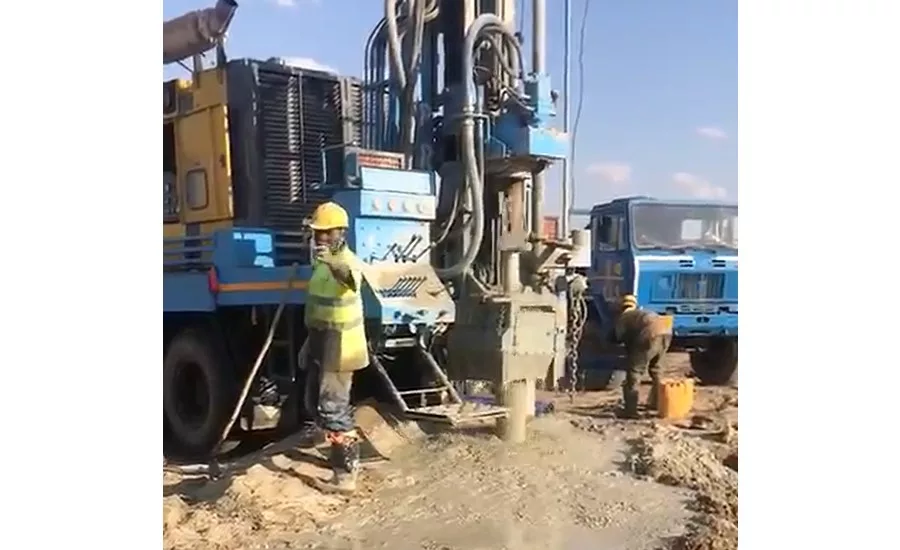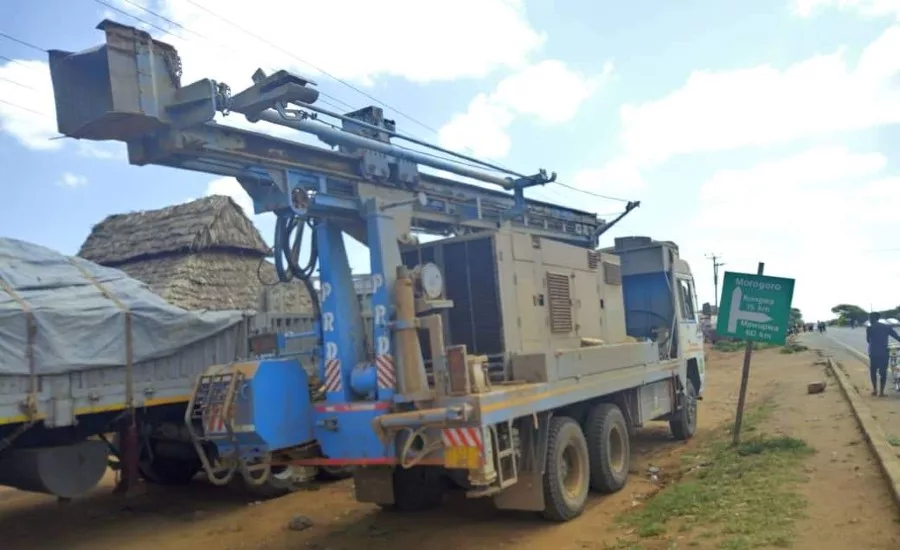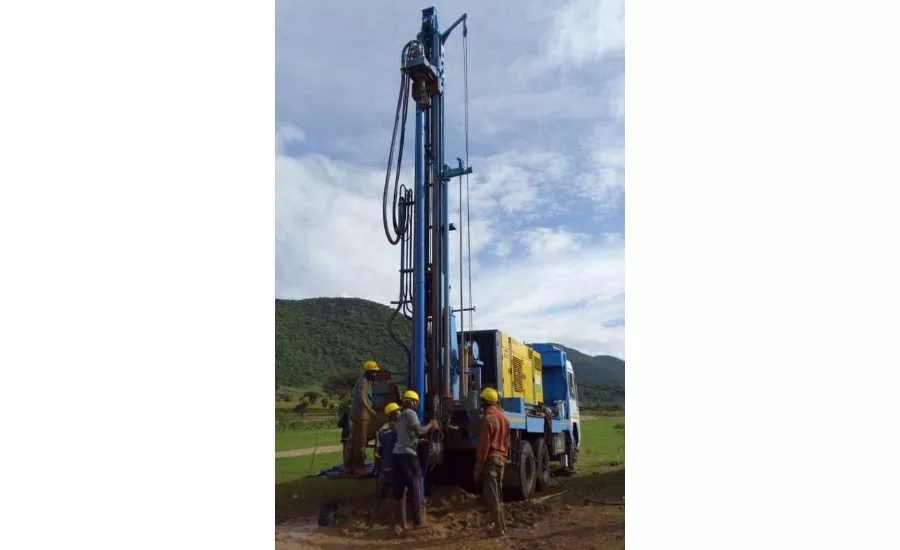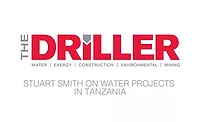Hydrologist Discusses Water, Drilling Project Work in Tanzania
Stuart Smith of Ground+Water Tanzania Ltd. on Overseas Water Projects

Stuart Smith of Ground+Water Tanzania Ltd. says he and his partner, Naftal Mandi, find plenty of well-trained local drilling talent in Tanzania.
Source: Stuart Smith

Ground+Water Tanzania Ltd. does water system planning, construction and inspection. Stuart Smith says the company puts in a lot of road time. The remoteness of some jobsites means you have to arrive prepared, or you’ll stall the project with an all-day parts run.
Source: Stuart Smith

“My experience with a lot of mechanical people in Tanzania,” Smith says, “is that they’re highly observant and systematic, and pick things up very quickly. So it’s not been a huge challenge to hand a brand new drilling rig over to them.
Source: Stuart Smith
Giving back just drives some people, whatever the motivation. For Stuart Smith of Ohio-based Ground Water Science, that motivation comes from his faith. His giving back started as charity work through church connections. It evolved into him putting his groundwater problem-solving skills to work planning and managing water infrastructure projects in Tanzania.
Smith, MS, CGWP, RG, serves as the U.S.-based partner of Ground+Water Tanzania Ltd. With Naftal Mandi, MPH, MBA, as the partner on the Tanzania side, the company does water system planning, construction and inspection, geophysical surveys, and pumping tests.
While Ground+Water Tanzania Ltd. is a company, not a non-profit, they’re committed to providing services at a reasonable cost using a “Tanzanian first” approach to expertise on all projects. Smith, a veteran hydrogeologist and groundwater consultant came on our Drilling In-Site video and podcast series to discuss what he calls his “life of slime.” (Click here to see the full video, or here to listen to the podcast.) This is an edited summary of the talk.
Q. Tell us about your role working overseas. What motivates that work, and how did you choose the areas of Africa you work in?
A. That was somewhat indirect. I’m a Lutheran Christian and our churches in northwest Ohio at that time were linked with the Dodoma Diocese in central Tanzania. So some of us went there to visit — I first visited in 1999. … Dodoma one of those high, dry places, sort of like New Mexico, quite a bit like that. So water, of course, is an issue. You get to know people and start talking and discussing, and then I was advising on water projects from a distance independently for a while. My current business partner asked me to get involved in managing water projects about 2012 or so, and we that’s how I got connected with that. I only work [overseas] in Tanzania. I haven’t worked anywhere else other than sort of tangentially. That may change, but it’s a big enough country in its own right.
Q. Let’s compare and contrast working in Tanzania versus the United States. What challenges do you see there, for example in hiring or technology, that U.S.-based drillers would immediately relate to?
A. There’s a lot of it that’s actually quite similar to, particularly, the parts of the United States in which everything is spread out. Low population density where it’s not unusual to go 400, 500 miles to go get a drilling tool or something. It’s not actually that unusual and the logistical supply train is better than you would think it would be because of the international connections there. You do have to plan out everything. It’s a long ways between everything. So it’s a six- or eight-hour drive plus two hours sitting in traffic at Dar es Salaam if you have to go down there for something. You don’t want to forget anything when you go out to the jobsite. Maybe this is the only time of year you can ford that river to get over there, so you had better get it done before the floods come up back up again. It’s that kind of situation.
Q. On the flipside, what challenges are unique to developing countries?
A. Tanzania, as opposed to maybe other places in Africa, is just not that difficult. It’s relatively peaceful. There’s a fuel stop everywhere where everything’s diesel. You can get stuff flown in it. It’s not like some kind of caricature of deepest, darkest Africa, despite what the State Department says. The crime rate is not exceptionally high. It’s way worse in Florid, as a far as I’m concerned.
For me, the language barrier of course is an issue. People generally speak and think in Swahili. It’s a running joke all day long in Swahili that I’m not getting, and you know what, I’m there. But then the young guys, they can rip back and forth between English and Swahili without even taking a breath. That’s really impressive for me. I mix up my bad Spanish and my bad Swahili in that little part of my brain where it goes. That’s communication.
Plus, people in the rural often just really don’t know much about the rest of the world or how things are going. It’s a contrast. Some places are very cosmopolitan. Some places are, you know, “We’ve heard there’s things called buses.” You know, that level of thing, and people walk everywhere or ride a bike or something like that. It’s a lot of contrast.
Q. Describe the types of drillers you work with. Do you bring trained professionals, or do you call on and train up local talent?
A. One of the advantages of working around Dodoma is that there’s a pool of experienced drillers that that we can rely on. For example, the Drilling and Dam Construction Agency, which is sort of quasi-private — it used to be the government drilling company, was always based there. Then there are some other church-related and so on drilling companies that have been active for a while. So Naftal Mandi, my business partner, he just chatted up some of these guys that were looking for something different, and we have an experience drilling crew. They didn’t go to school for it or anything. They just learn it. My experience with a lot of mechanical people in Tanzania is that they’re highly observant and systematic, and pick things up very quickly. So it’s not been a huge challenge to hand a brand new drilling rig over to them.
The Full Interview
We interviewed Stuart Smith for episode 24 of our Drilling In-Site series. In addition to these questions, our talk covered how to find good local log data and how a hydrologist thinks about siting wells. See the full conversation at www.thedriller.com/insite, or listen to the podcast version at www.thedriller.com/insite-podcast. Episodes also in Apple’s Podcast store. Search Drilling In-Site and tap Subscribe.
Working on an interesting project or have industry wisdom to share? Email verduscoj@bnpmedia.com to be considered for a guest spot on Drilling In-Site.
Looking for a reprint of this article?
From high-res PDFs to custom plaques, order your copy today!



